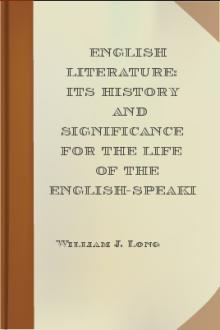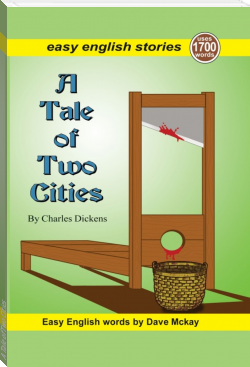English Literature: Its History and Significance for the Life of the English-Speaking World by William J. Long (good books for 8th graders txt) 📕

- Author: William J. Long
- Performer: -
Book online «English Literature: Its History and Significance for the Life of the English-Speaking World by William J. Long (good books for 8th graders txt) 📕». Author William J. Long
The Project Gutenberg EBook of English Literature, by William J. Long
This eBook is for the use of anyone anywhere at no cost and with
almost no restrictions whatsoever. You may copy it, give it away or
re-use it under the terms of the Project Gutenberg License included
with this eBook or online at www.gutenberg.net
Title: English Literature
Its History and Its Significance for the Life of the English Speaking World
Author: William J. Long
Release Date: January 6, 2004 [EBook #10609]
Last Updated: January 17, 2018
Language: English
*** START OF THIS PROJECT GUTENBERG EBOOK ENGLISH LITERATURE ***
Produced by Kevin Handy, Dave Maddock and PG Distributed Proofreaders
ITS HISTORY AND ITS SIGNIFICANCE
FOR THE LIFE OF THE ENGLISH-SPEAKING
WORLD
A TEXT-BOOK FOR SCHOOLS
BY
WILLIAM J. LONG, PH.D. (Heidelberg)
MY FRIEND
C H T
IN GRATITUDE FOR
HIS CONTINUED HELP IN THE
PREPARATION OF
THIS BOOK
Illustration: CANTERBURY PILGRIMS From Royal MS., 18 D.ii, in the British Museum
CANTERBURY PILGRIMS From Royal MS., 18 D.ii, in the British Museum
This book, which presents the whole splendid history of English literature from Anglo-Saxon times to the close of the Victorian Era, has three specific aims. The first is to create or to encourage in every student the desire to read the best books, and to know literature itself rather than what has been written about literature. The second is to interpret literature both personally and historically, that is, to show how a great book generally reflects not only the author's life and thought but also the spirit of the age and the ideals of the nation's history. The third aim is to show, by a study of each successive period, how our literature has steadily developed from its first simple songs and stories to its present complexity in prose and poetry.
To carry out these aims we have introduced the following features:
(1) A brief, accurate summary of historical events and social conditions in each period, and a consideration of the ideals which stirred the whole nation, as in the days of Elizabeth, before they found expression in literature.
(2) A study of the various literary epochs in turn, showing what each gained from the epoch preceding, and how each aided in the development of a national literature.
(3) A readable biography of every important writer, showing how he lived and worked, how he met success or failure, how he influenced his age, and how his age influenced him.
(4) A study and analysis of every author's best works, and of many of the books required for college-entrance examinations.
(5) Selections enough--especially from earlier writers, and from writers not likely to be found in the home or school library--to indicate the spirit of each author's work; and directions as to the best works to read, and where such works may be found in inexpensive editions.
(6) A frank, untechnical discussion of each great writer's work as a whole, and a critical estimate of his relative place and influence in our literature.
(7) A series of helps to students and teachers at the end of each chapter, including summaries, selections for reading, bibliographies, a list of suggestive questions, and a chronological table of important events in the history and literature of each period.
(8) Throughout this book we have remembered Roger Ascham's suggestion, made over three centuries ago and still pertinent, that "'tis a poor way to make a child love study by beginning with the things which he naturally dislikes." We have laid emphasis upon the delights of literature; we have treated books not as mere instruments of research--which is the danger in most of our studies--but rather as instruments of enjoyment and of inspiration; and by making our study as attractive as possible we have sought to encourage the student to read widely for himself, to choose the best books, and to form his own judgment about what our first Anglo-Saxon writers called "the things worthy to be remembered."
To those who may use this book in their homes or in their class rooms, the writer ventures to offer one or two friendly suggestions out of his own experience as a teacher of young people. First, the amount of space here given to different periods and authors is not an index of the relative amount of time to be spent upon the different subjects. Thus, to tell the story of Spenser's life and ideals requires as much space as to tell the story of Tennyson; but the average class will spend its time more pleasantly and profitably with the latter poet than with the former. Second, many authors who are and ought to be included in this history need not be studied in the class room. A text-book is not a catechism but a storehouse, in which one finds what he wants, and some good things beside. Few classes will find time to study Blake or Newman, for instance; but in nearly every class there will be found one or two students who are attracted by the mysticism of Blake or by the profound spirituality of Newman. Such students should be encouraged to follow their own spirits, and to share with their classmates the joy of their discoveries. And they should find in their text-book the material for their own study and reading.
A third suggestion relates to the method of teaching literature; and here it might be well to consider the word of a great poet,--that if you would know where the ripest cherries are, ask the boys and the blackbirds. It is surprising how much a young person will get out of the Merchant of Venice, and somehow arrive at Shakespeare's opinion of Shylock and Portia, if we do not bother him too much with notes and critical directions as to what he ought to seek and find. Turn a child and a donkey loose in the same field, and the child heads straight for the beautiful spots where brooks are running and birds singing, while the donkey turns as naturally to weeds and thistles. In our study of literature we have perhaps too much sympathy with the latter, and we even insist that the child come back from his own quest of the ideal to join us in our critical companionship. In reading many text-books of late, and in visiting many class rooms, the writer has received the impression that we lay too much stress on second-hand criticism, passed down from book to book; and we set our pupils to searching for figures of speech and elements of style, as if the great books of the world were subject to chemical analysis. This seems to be a mistake, for two reasons: first, the average young person has no natural interest in such matters; and second, he is unable to appreciate them. He feels unconsciously with Chaucer:
And as for me, though that my wit be lytë,On bookës for to rede I me delytë.
Indeed, many mature persons (including the writer of this history) are often unable to explain at first the charm or the style of an author who pleases them; and the more profound the impression made by a book, the more difficult it is to give expression to our thought and feeling. To read and enjoy good books is with us, as with Chaucer, the main thing; to analyze the author's style or explain our own enjoyment seems of secondary and small importance. However that may be, we state frankly our own conviction that the detailed study and analysis of a few standard works--which is the only literary pabulum given to many young people in our schools--bears the same relation to true literature that theology bears to religion, or psychology to friendship. One is a more or less unwelcome mental discipline; the other is the joy of life.
The writer ventures to suggest, therefore, that, since literature is our subject, we begin and end with good books; and that we stand aside while the great writers speak their own message to our pupils. In studying each successive period, let the student begin by reading the best that the age produced; let him feel in his own way the power and mystery of Beowulf, the broad charity of Shakespeare, the sublimity of Milton, the romantic enthusiasm of Scott; and then, when his own taste is pleased and satisfied, a new one will arise,--to know something about the author, the times in which he lived, and finally of criticism, which, in its simplicity, is the discovery that the men and women of other ages were very much like ourselves, loving as we love, bearing the same burdens, and following the same ideals:
Lo, with the ancientRoots of man's nature
Twines the eternal
Passion of song.
Ever Love fans it;
Ever Life feeds it;
Time cannot age it;
Death cannot slay.
To answer the questions which arise naturally between teacher and pupil concerning the books that they read, is one object of this volume. It aims not simply to instruct but also to inspire; to trace the historical development of English literature, and at the same time to allure its readers to the best books and the best writers. And from beginning to end it is written upon the assumption that the first virtue of such a work is to be accurate, and the second to be interesting.
The author acknowledges, with gratitude and appreciation, his indebtedness to Professor William Lyon Phelps for the use of his literary map of England, and to the keen critics, teachers of literature and history, who have read the proofs of this book, and have improved it by their good suggestions.
WILLIAM J. LONG STAMFORD, CONNECTICUT
CONTENTS CHAPTER I. INTRODUCTION--THE MEANING OF LITERATURE The Shell and the Book. Qualities of Literature. Tests of Literature. The Object in studying Literature. Importance of Literature. Summary of the Subject. Bibliography. CHAPTER II. THE ANGLO-SAXON OR OLD-ENGLISH PERIOD Our First Poetry. "Beowulf." "Widsith." "Deor's Lament." "The Seafarer." "The Fight at Finnsburgh." "Waldere." Anglo-Saxon Life. Our First Speech. Christian Writers. Northumbrian Literature. Bede. Cædmon. Cynewulf. Decline of Northumbrian Literature. Alfred. Summary. Bibliography. Questions. Chronology. CHAPTER III. THE ANGLO-NORMAN PERIOD The Normans. The Conquest. Literary Ideals of the Normans. Geoffrey of Monmouth. Work of the French Writers. Layamon's "Brut." Metrical Romances. The Pearl. Miscellaneous Literature of the Norman Period. Summary. Bibliography. Questions. Chronology. CHAPTER IV. THE AGE OF CHAUCER History of the Period. Five Writers of the Age. Chaucer. Langland. "Piers Plowman." John Wyclif. John Mandeville. Summary. Bibliography. Questions. Chronology. CHAPTER V. THE REVIVAL OF LEARNING Political Changes. Literature of the Revival. Wyatt and Surrey. Malory's "Morte d'Arthur." Summary. Bibliography. Questions. Chronology. CHAPTER VI. THE AGE OF ELIZABETH Political Summary. Characteristics of the Elizabethan Age. The Non-Dramatic Poets. Edmund Spenser. Minor Poets. Thomas Sackville. Philip Sidney. George Chapman. Michael Drayton. The Origin of the Drama.




Comments (0)